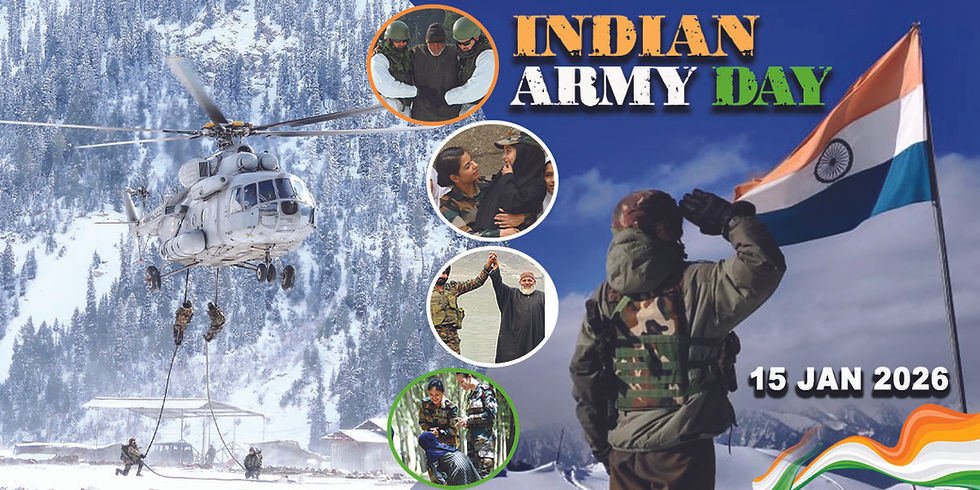Life Of A Bakarwal
- Soldier Stories Of Kashmir

- Jul 17, 2020
- 3 min read
Updated: Jul 18, 2020
By S K Patra
The author shared this beautiful write up surrounding Bakarwals hailing from Kashmir Valley exclusively for Soldier Stories of Kashmir.The lucid writing vividly paints fresh masterpiece ,singing culture of Kashmir and the amity with soldiers coming from different states of India.This is a story behind the Line of Control in warm shades.
A major community found in the Shamshabari region of the Kashmir valley are the tribal Gujjar-Bakarwals. The Bakarwals are mostly Sunni Muslim nomadic tribe and are traditionally Goatherds and Shepherds. As Sheep and Goat rearing community, the Bakarwals alternate with the seasons between high and low altitudes during the summers and winters respectively in the hills of the Himalayas. This story pertains to the lifestyle of one such Bakarwal family that resides very close to our Army Base during the summers every year.
Moosa Ahmed is the head of the Bakarwal family that migrates to this place with his extended family from Naushera in Rajouri district which is 300 kms from Kupwara. The nomadic Bakarwals like Moosa have been traversing the length and breadth of the state of Jammu and Kashmir with their livestock for centuries. Their life is determined by the vagaries of the weather and they wander around this place for the whole summers. Moosa’s old eyes have seen the LOC very closely since decades. His family has witnessed numerous army units inducting and de-inducting, innumerable war-like situations, Cease Fire Violations and also being in close contact with the nearby villagers, he has assisted the Armed Forces and provided many important inputs. He has built his rapport amongst the armed fraternity and the area where his family dwells came to be known as “Moosa Bhaik”. Till previous year, Moosa used to be the guide and the head of the family but now, the old age has taken its toll and he is ailing back at his home in Naushera.
It is now Mohd. Akram, his elder son who has taken the reins of the family and is following his father’s footsteps. Akram, 52 years old and now the head of the family, has a flowing white beard and Kohl-laced eyes. His extended family consists of 14 members including his wife, brother and sister and their spouses and eight children of the whole family. He also has the responsibility to feed their 200 Sheeps, 120 Goats, 8 Cows and 4 Ponies.The male members of the family have already set up their mud huts at Moosa Baihk this year
like every other year. They will spend the whole summer here and will return back to their village before the first snowflake begins to fall in the valley in the winters. Most of them are dressed in stained and patchy winter clothes, even though summer has set in and their clothes get torn while running after their livestock through thorny bushes. Their everyday life is usually monotonous as the women are entrusted to collect firewood, look after the kids, cook food and wash clothes while the male members graze sheep and goats besides doing other jobs that need more physical strength. The children, in addition to providing a helping hand to the ladies, also take care of the ponies and tend them.

Curiously, there are also several Bakarwals who don’t have their own livestock and tend to the livestock of other community members for a livelihood. Akram too has engaged
two young men to share his responsibilities. Those nomads who look after the livestock of other nomads are called ‘Aajdis’ in their dialect. En-route to this place, Akram and his family had to face a lot of challenges as majority of the forests have been fenced out by the Govt. Over the years, vehicular traffic has increased on the mainland and negotiating the route with the flock has been a difficult job. However, their travel in search for green pastures for their cattle around the Himalayas continues. Akram’s family has happily synchronized their life with the Army deployed here. Whenever they face a problem, they reach out to the Army for help, be it their social, medical or water needs. They act as eyes and ears of the Forces while the Army also engages some of the male members as Porters in the Unit trying to give them some seasonal employment. Bakarwal families like Akram’s teach us the daunting spirit of life and we realize that life is perennial.



Comments